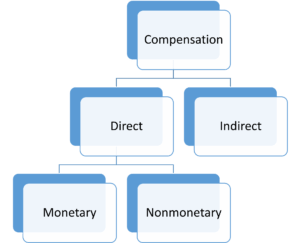Compensation Management | Key to Organizational Productivity and Success

Compensation management, as the name suggests is about ensuring that the employees of a company are suitable rewarded monetarily, and non-monetarily, for the work they perform in and on behalf of the organization.
Introduction
Compensation management thus is the overall management of all the activities performed within the HR department to achieve the above objective. It is worth mentioning that compensation management is a double-edged sword. If done properly, it can create a team of highly skilled and motivated employees, and if not, the company may face unprecedented attrition – severely impacting its reputation and bottom line.
Objectives of Compensation Management
Compensation management as function serves many purposes, the important of them are as described below.
Employee Retention
Compensation management studies the prevailing trends of compensation across competition. This information helps the organization to match its own compensation with the market trend. If it is done properly, the employees generally will have one reason less to look for alternatives. Besides this, the study of prevailing compensation helps the HR department to plan and budget their compensation expenses for future.
Talent Acquisition
To attract talent, it is important to offer them competitive compensation packages for them to jump the fence. Therefore, compensation management can help and contribute towards attracting fresh talent from the industry pool.
Maintaining Employee Morale
Compensation can either be a motivator or be just a hygiene factor. That entirely depends upon how it is perceived. As a hygiene factor, it does not add to the employee moral but if designed and presented skillfully, it can motivate a company’s employees to its benefit.
Determining Basic Wages & Salaries
Knowledge of prevailing compensation trends in the industry also help an organization to use it as a base to determine their own compensation structure. That way the HR and line managers can design more relevant job descriptions and job specifications.
Rewarding Good Performance
Good performing employees expect prompt and appropriate recognition, failing which, the organization may end up with demotivated or no employees at all. It is thus of the utmost importance to visibly compensate good performance, over and above the base compensation, for both, rewarding good performance and setting an example.
Structure of Compensation
Different components of compensation are listed and described below.

Direct Compensation
Direct compensation is the most visible ‘give’ part of the ‘give and take’ mechanism. This is the most tangible part of the compensation and is therefore on the top of an employee’s evaluation of the company.
Monetary
Monetary compensation takes care of the basic requirements of the employees. It is the money for which they work in the first place. This is passed on to the employees mostly in form of monthly paycheck. This component is primarily a hygiene factor made of the following subcomponents.
- Base Pay
- Allowances
- Bonus
- Incentives
- Perks
Nonmonetary
This is the non-tangible portion of the compensation that a company offers its employees. The factors listed below cannot be quantified, but are important because besides money, people join or continue to work in a company not only for money but also for other reasons as mentioned below.

- Dignity & Satisfaction
- Social Relations
- Sufficient Resources
- Supportive Leadership
- Psychological Well Being & Intellectual Growth
Indirect Compensation
This component of the compensation is not directly linked to a job role, rather is available to every employee as an employee welfare initiative. This helps in building a supportive culture in the organization. Most visible subcomponent are as listed below.
- Insurance
- Medical
- Leave
- Uniform
- Entertainment
- Equipment
- Superannuation Benefits
Importance of Compensation Management
Compensation management is one of the core functions of an organization that has the potential to impact every other function of the organization. This is true because ultimately everyone works for the money and the associated benefits that they get from the organization in lieu of the contributions they make towards its continuation and growth. Here are the areas that are influenced by the compensation policies of the organization.
Job Analysis
While designing a new job, along with the job description and job specification, it is also important to establish an attractive compensation package for the new job role. Compensation structure of the organization helps with that information.
Related – Job Analysis, Job Design & Human Resources Planning
Talent Acquisition
Compensation policies of an organization directly impact its talent acquisition abilities. An attractive compensation package creates a desire amongst the industry professionals to join the company and puts the organisation in a strong position w.r.t talent acquisition.
Talent Retention
A carefully drafted and executed compensation policy creates a satisfying and stimulating work environment. The employees voluntarily want to remain associated with the company. A good compensation policy reduces the number of reasons why an employee would consider alternative employment options outside the company.
Job Satisfaction
When employees are adequately compensated, both monetarily and non-monetarily there is job satisfaction. Job satisfaction translates into higher productivity and a better competitive position for the organization.
Productivity
Compensation policies of an organization influence productivity by creating opportunities for skill development and enhanced motivation. Highly skilled and motivated workforce eventually enhances productivity for the organization.
Reputation
Attractive compensation policies keep the employees motivated and create aspiration for the others in the market to join the company. Besides the job market, the existing employees of the company act as brand ambassadors and help in enhancing the reputation of the organization in the overall market.
Factors Affecting Compensation
The actual compensation on the ground is influenced by many factors, some of which are internal to the organization and the others are external. let’s look at the internal and external factors that affect actual compensation as below.
Internal
These are those factors which are within the organization and to a large extent within the control of the managers of the company. The most important ones are as listed below.
Compensation Policy
The compensation policy of an organization is drafted at the senior most level of the management. Policies like the annual increment percentage, bonus policies, productivity linked incentives, fringe benefits etc. influence the actual compensation for the employees on the ground.
Financial Capabilities
No matter what is the compensation policy or the market trends, ultimately everything depends upon the financial capabilities of the organization. Whether the organization is able to offer good and attractive compensation to its employees depends upon its own financial position. on paper the compensation policy maybe very competitive and may aim to attract and retain the best talent in the market but, if the company does not have the financial resources to support that compensation policy, it only remains on the paper as an unexecuted policy.
Job Analysis
Compensation for jobs at different levels depends upon the detailed job analysis. What is the job and what are the requirements (qualifications/skills) of the incumbent to do that job determine the compensation levels. For example, if a job is identified as a hazardous job, then there must be additional compensation built in for the risk involved. Similarly, if a job requires a very rare skill set, it must be compensated accordingly and adequately. The availability of the resources for a specific skill also determines the compensation level for a position that requires them.
Employees
The employees and their unions play influence compensation, especially in labor intensive industries. Employee unions or trade unions negotiate compensation levels with the management and the compensation policies are designed in accordance with the agreed policies. In companies were there are no unions, employees still do influence the compensation policy by offering higher productivities which in turn allows the management to offer attractive compensation levels and vice versa.
External
There are many external factors that influence the compensation policy and compensation levels of an organization. These are mostly environmental factors that impact the entire industry or a sector. Most important external factors that influence compensation levels and the compensation policy are as listed below.
Demand & Supply
This is the most basic factor to understand amongst the external factors. If the demand for human resources outweighs the supply available in the market, then obviously the companies will be trying to attract the scarce resources by offering them attractive compensation and thus the compensation levels will go up. This is more evident in the case of human resources required with some specific or rare skills.
Also Read – Talent Acquisition – Supporting The Corporate Strategy
Competitive Trends
Compensation levels also are influenced by the competitive trends in the industry and the sector. When a company starts paying higher compensation to its employees and starts offering higher compensation to potential employees, other companies experience attrition and to curb the same they try to match up the compensation levels. As a result, the compensation levels and the compensation policies of the entire industry and the sector move upwards and vice-versa.
Cost of Living
That is one of the most realistic factors that influence compensation levels externally. The cost of living in the city of posting or the area of deployment is an important factor in determining the compensation levels for that place. For example, in tier 1 cities the cost of living is high. Real estate, food, transportation and education, everything is at a premium, so the compensation levels need to be designed accordingly. On the other hand, small towns and countryside locations have a much lower cost of living and the compensation is lower there as compared to premium cities.
Labor Laws
Labor laws of a country or region determine the minimum wages for every position and sometimes even the highest levels of compensation for every position are also defined. There is no leverage available in such cases and the compensation levels must be designed within the upper and lower limits of compensation for every position in the organization.
Economy
Compensation policies and compensation levels are directly influenced by the economic trends. For example, during recession when many employees are without work, they would readily join at a lower compensation level. Another justification for offering lower compensation during economic recession is that the company itself is also not making enough money to support higher compensation. On the other hand, during economic boom, human resources are in great demand which results in them seeking higher compensation levels and the companies too can also afford to pay higher compensation because they also making a lot of profits, owing to a heightened demand.
Conclusion
An organization’s productivity can be increased by creating and sustaining employee engagement & satisfaction, thanks to a carefully planned compensation management. Additionally, it aids in improving the company’s brand image among all its stakeholders.









